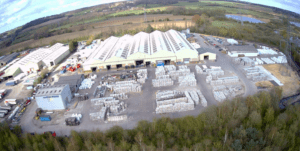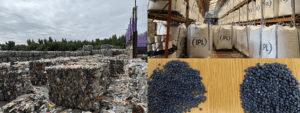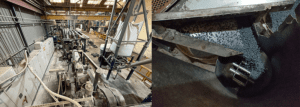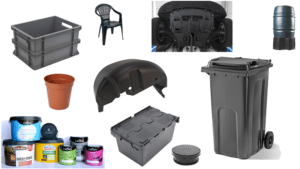
PlastikCity on Tour – IPL Brightgreen
|
Getting your Trinity Audio player ready...
|
Our latest stop took us to the impressive recycling facilities of IPL Brightgreen in Castleford, West Yorkshire. Specialising in reprocessing post-consumer recycled (PCR) plastics, IPL Brightgreen turns mixed plastics from around the UK into near-virgin quality plastic pellets – ready to be used as the raw materials for new products in a wide variety of industries.
We had the pleasure of meeting IPL Brightgreen’s Head of Technical and Quality, Jonathan Attwood, who walked us through the company’s history, gave a tour of its comprehensive recycling processes, and explained how IPL Brightgreen continues to lead in the production of recycled plastic pellets for a wide range of industries.
Join us as we explore how IPL Brightgreen balances innovation with environmental responsibility while maintaining its reputation as a trusted name in the plastics recycling sector.
A Historical Location – From Coal to PCR
The IPL Brightgreen site located just North of Castleford, West Yorkshire, carries an interesting legacy. Originally housing the workshops of the National Coal Board, the coal industry was the area’s largest employer in the mid-20th Century, with dozens of mines in the area, as close as the nearby villages of Allerton Bywater, Fryston and Wheldale, all within a few miles of the site. Since then, the facility has undergone a significant transformation, and it now operates as a leading hub of modern plastics recycling in the UK.
IPL Brightgreen traces its journey in the area back to 1992 when it emerged as a subsidiary of the LINPAC Group, a large packaging group founded in the area. Followed by a variety of identities, including Regain and Imerys, the company became Brightgreen Plastics in 2019. Shortly after, in 2021, Brightgreen Plastics underwent a transformative rebranding process, following its acquisition by the IPL Global Group of Companies, a large multi-national moulding company, headquartered in Ireland, finally becoming known as IPL Brightgreen, as it is today. With the establishment of its new brand, IPL Brightgreen has embarked on its mission to redefine the sector, as a bold ‘pro-plastic’ voice in the recycling sector, reflecting a genuine commitment to advancing sustainable practices and promoting a positive narrative around plastic usage and plastic recycling.

Site Tour – From Bale to Pellet
Before we sat down to discuss the industry in more detail with Jonathan, we donned a hard hat, safety shoes and high-vis jackets for the full site tour, following the progress of material from its arrival in the yard in a mixed bale to leaving as a plastic pellet, ready to be manufactured into a new plastic product, all under one roof.

The scale of Brightgreen’s operation was immediately obvious to see. Housed in the same plant is one sorting line, three washing lines, a dry granulation line and seven extrusion lines, all cleverly interconnected with a mass of automation, conveyors and machinery.
The journey of a polymer through the plant starts in the yard, where mixed bales are delivered by the tonne. IPL Brightgreen is often the second step in the chain – after your mixed recyclables are collected kerbside, they’re taken to an MRF (material recovery facility) to be sorted and split into different streams, such as paper and board, glass, metals and plastics.
These mixed plastic bales are then brought to the IPL Brightgreen site, to be sorted, granulated, washed and analysed, before being compounded into new material. The site sorts all types of plastics but retains all HDPE (high-density polyethylene) and PP (polypropylene) in particular, for further processing and compounding – all other grades are separated, collected and sent to other specialist companies for further processing.
Figure 3 The sorting line uses NIR vision technology and compressed air to separate items by polymer type. Keep an eye out for some materials being blown above the separator and others falling below.
The first stop for the mixed plastics is the sorting line. With around 5 tonnes per hour capacity, this line sorts around 250,000 individual plastic items every hour, using both physical properties and NIR (near-infrared spectroscopy) technology to identify the polymer composition of each item. Then, built-in pumps inside the conveyor blast the item with a jolt of air as it approaches the end of the conveyor, sorting some items out of the main stream following a positive identification.
Jonathan stressed the high levels of quality control in this process, with negative streams being cycled multiple times before moving on to the next stage, the process is incredibly accurate, as well as exciting to watch, as items are flipped up and over the separator at the end at high speed.
This upgraded line is a recent investment for the company, costing upwards of £4.5million, a huge investment made to increase accuracy in sorting and improve the capacity of the site.
“We invested in the process because we were fed up with the variable quality we received from elsewhere when buying pre-sorted materials. We were typically looking at 90% accuracy, which leaves 10% contamination in there, which is then hard to separate once you’re at the washing and granulation stage. So that’s why we went ahead with the investment, and we’ve seen a huge increase in our sorting accuracy and quality processes since then,” added Jonathan.
Once sorted, the plastics are transported through one of the site’s three washing lines. The only part of the process which was a bit smelly (surprisingly!) was these washing lines, which use a combination of friction, water and cleaning solutions and a variety of wet and drying stages to remove all contaminants from the plastic material. During this process, the product is granulated, leaving a clean and pure polymer flake, as shown above (right).
Adding Value – Clean & Quality Pellets
The IPL BG site has seven extrusion lines, used to turn this cleaned flake product into high-value polymer pellets, ready for further manufacturing.

As a chemist by trade, Jonathan explained the complex chemical formulations required to compound this new material. All of IPL Brightgreen’s recycled polymer output is manufactured to exact customer requirements, and the company’s on-site quality laboratory carries out a multitude of tests on the finished product. From tensile strength and flex properties to MFI (melt flow index) and moisture and ash tests, every recycled pellet is tested per batch, ensuring the highest quality material leaves the facility, with minimal batch-to-batch variation, typically a problem associated with manufacturers moulding from PCR materials
Crucially, with everything in control under one roof, from sorting and washing to compounding and quality control, IPL Brightgreen is distinct due to the overall level of control and rigorous quality management it has over the entire process, from bale to pellet.

Breaking the Misconceptions around PCR
Poor quality or high batch-to-batch variation are typically issues talked about by companies manufacturing products incorporating PCR polymers, but it is clear from the site tour that controls are put into place at every stage to minimise these issues, to great effect.
Jonathan reiterated that the site is now operating to ~99% accuracy, a hugely impactful improvement in quality standards following recent investment and improvements in processes. This level of precision is crucial for producing consistent, high-quality pellets that meet the exacting standards of their customers.

Following the tour, we sat down with Jonathan to discuss IPL Brightgreen’s role in the industry in more detail. We also browsed a selection of finished components on display in the company’s boardroom, ranging from large and robust wheelie bins, to paint pots, drainage products and car components.
Interview with IPL Brightgreen’s Jonathan Attwood
Will Clarke: Jonathan, could you start by telling us who your target market is?
Jonathan Attwood: “Sure. Around 45% of our output goes to other members within the IPL Group. This internal supply is crucial, especially with all the environmental regulations tightening, large moulding companies are moving to secure a reliable supply of high-quality PCR for their own moulding requirements. The remaining 55% is sold to external customers—mainly moulders and extruders. We supply a lot of recycled PP grades to injection moulding customers and HDPE extrusion grades.”
And where do you source your raw materials?
Jonathan Attwood: “Most of our feedstock—between 90% and 95%—comes from post-consumer recycled plastics. We buy mixed bales from curbside waste collectors and other recyclers, and some of our customers also approach us with scrap that they want us to reprocess.”
What are the key products and services you provide?
Jonathan Attwood: “We handle the entire recycling process in-house. Our Castleford site has one sorting line, three washing lines, a dry granulation line, and seven extrusion lines. This setup allows us to take mixed plastic bales and turn them into high-quality recycled pellets. The whole process is done on-site, which gives us the highest level of control over our quality. This means the pellets we produce at the end are incredibly consistent and have near-virgin properties.”
And you do all your QC testing on-site to prove those properties?
Jonathan Attwood: “Absolutely. Every batch goes through rigorous testing. We check tensile strength, flexural properties, moisture content, ash content, and more. We even use Differential Scanning Calorimetry, or DSC-OIT, to ensure that our products meet the required standards for stability and performance. This removes the usual fears around batch-to-batch inconsistency, commonly associated with recycled grades.”
What sets IPL Brightgreen apart from your competitors?
Jonathan Attwood: “I’d say one of the main things is that we’re entirely customer-led. All our products and specifications are tailored to meet our customers’ needs 100%. Often, we can offer cheaper alternatives that still meet the necessary performance standards.”
“Quite often a customer will come and say, “we need this” but we will ask, “How do you know you need that, exactly?” – We work with them on a technical level, using our expertise to tailor the highest quality and most cost-effective solution for their particular product or application.
“Many customers who have used a certain material the entire time, because it works or because it’s what they’re used to, end up choosing these tailored options after we show them the possibilities. So, it’s less ‘off-the-shelf’ grades and more a customisable solution for a specific application, based on the control we have over our entire process.”
That sounds like a real advantage.
Jonathan Attwood: “It is, and another big advantage is that we manage the whole recycling process on-site. This gives us far better control over quality at every stage. When we were buying pre-sorted materials from others, the accuracy was only around 90%, which left a lot of contamination to deal with. That’s why we invested in our own sorting facility. Now, we can ensure our sorted plastics have a 98-99% accuracy rate.”
Do you also offer support to your customers during the trial phase?
Jonathan Attwood: “Yes, we actively encourage customer visits and provide technical support during trial runs. I’ve got experience in both injection moulding and extrusion, so I often oversee the trials myself. Sometimes transitioning from virgin to recycled materials requires adjustments, and we’re well-prepared to help customers make those changes and find solutions that work for them.”
Looking ahead, what are IPL Brightgreen’s plans for the next 12 months?
Jonathan Attwood: “Right now, our focus is on maintaining the quality of our products and services, while continuing to upskill our workforce. We’re also looking to create more apprenticeship roles. We’ve got several apprentices on-site, and we’re expanding our training programmes. Recently, we had an employee from the quality department start an apprenticeship to gain a formal qualification and we also have several senior and technical staff who started their careers as apprentices. This is really important to the business and the industry in general.”
Are you planning to attend any exhibitions in the next 12 months?
Jonathan Attwood: “Yes, we’ve regularly attend, exhibit and present at trade events such as RWM, GRIPS and the RECOUP conference. I was on a panel for one of the talks at RWM 24 recently.”
“We’re also planning to exhibit at PRSE (Plastics Recycling Show Europe) in Amsterdam next year—we’ve attended before, but this will be our first time exhibiting there, which I’m looking forward to.”
Sounds like a busy year ahead!
Jonathan Attwood: “Definitely! It’s always good to engage with the industry and showcase what we’re doing to promote recycling within the plastics sector.”
Look out for the next edition of ‘PlastikCity on Tour’ to learn more about our excellent UK-based partners.
There are now well over 260 active partners represented on the PlastikCity site, many of which offer highly specialised products or services to our sector.
During our everyday course of business, we’ll be making a point of visiting as many of these partners as we can and using the time to better understand what they offer the market. We’ll then showcase them through this ongoing series of articles.
Maybe you can benefit from their services!
Read more news from IPL Brightgreen.





